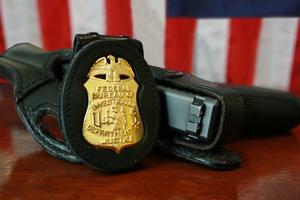Law-enforcement technologyWidely used FBI surveillance method ruled unconstitutional
A national security letters (NSLs) is an administrative subpoena which allows the FBI to ask Internet companies and communication service providers to turn over subscriber information on American customers, while prohibiting the providers from informing these customers that their personal information has been turned over to the FBI. Since the 9/11 attacks, the bureau has issued an average of 50,000 NSLs a year. A federal judge in California says this is “rendering the statute impermissibly overbroad.”

FBI NSL authority declared unconstitutional // Source: commons.wikimedia.org
A federal judge in California has ruled that an FBI surveillance tool being used to gather information on Americans without a court order is unconstitutional. The judge said that the use of national security letters (NSLs) by the agency was in violation of the First Amendment.
Judge Susan Illston’s ruling will stop the bureau from issuing NSLs.
An NSL is an administrative subpoena which allows the bureau to ask Internet companies and communication service providers to turn over subscriber information on American customers, while prohibiting the providers from informing these customers that their personal information has been turned over to the FBI.
The Washington Post notes that all the bureau needs to issue an NSL is proof that the records they are seeking are relevant to an authorized national security investigation. The FBI was granted the ability to use NSLs after the 9/11 attacks.
In Illston’s ruling, the judge acknowledged that there could be situations in which disclosing the receipt of an NSL could hurt an investigation, but the judge said there where no risk exits, “thousands of recipients of NSLs” are nonetheless gagged, “rendering the statute impermissibly overbroad.”
According to Illston, the bureau’s “pervasive use” of gag orders along with a failure to demonstrate the orders’ need to protect national security, “creates too large a danger that speech is being unnecessarily restricted.”
The ruling has been stayed while the government decides whether to appeal. In 2007 a federal judge in New York issued a similar ruling, but the decision was overturned narrowly on appeal.
The use of NSLs has been controversial from the start. The Justice Department inspector general said several years ago that the bureau was abusing its authority to issue NSLs, often failing to justify the need for surveillance. The bureau said it has fixed the issue, but many questions remain about the use of NSLs.
“NSLs are unique in their invasiveness and lack of judicial oversight,” Matt Zimmerman, a senior staff attorney with Electronic Frontier Foundation told the Washington Post.
Since the 9/11 attacks, the bureau has issued an average of 50,000 NSLs a year. According to the Justice Department, in 2011 the bureau made 16,500 requests for data on 7,200 Americans.
According to industry lawyer Michael Sussmann, a partner at Perkins Coie, the best result would be for Congress to decide what information can be obtained without court oversight.
